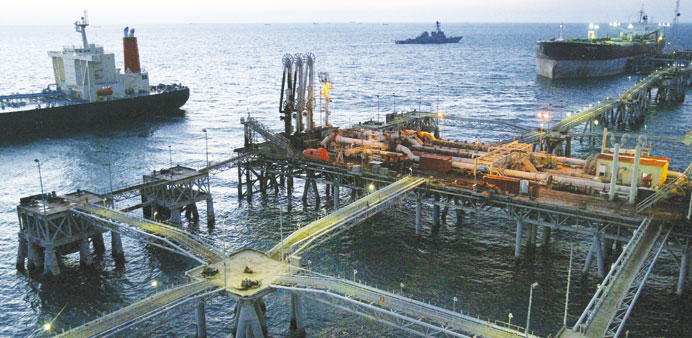A tanker leaves as another tanker loads oil at the Basra terminal, 50km south of Iraq (file). Crude exports from southern Iraq rose to a record this month.
Bloomberg/New York/London
Oil headed for its biggest monthly drop in almost seven years on speculation that increased Opec supplies and threats to demand in China will prolong a global glut.
Futures slid as much as 2.4% in New York and 1.6% in London. US crude stockpiles are almost 100mn barrels above the five-year seasonal average, while exports from southern Iraq rose to a record this month. Falling prices are weighing on Exxon Mobil Corp and Chevron Corp, the biggest US energy producers, which posted their worst quarterly performances in several years yesterday.
Oil’s worst month since November 2008 is part of a slump across raw materials amid expanding surpluses and concern that slower economic growth in China will crimp demand. Commodities also dropped as the dollar gained on signs that the Federal Reserve may increase rates, reducing their appeal. Sanctions on oil exports from Iran, which holds the world’s fourth-biggest crude reserves, may be lifted after a nuclear accord on July 14. “July has been a massacre,” Phil Flynn, senior market analyst for Price Futures Group, said by phone from Chicago. “It wasn’t just oil, commodities as an asset class got crushed. It was mostly due to expectations the Fed will raise rates, which sent the dollar higher, and concerns about China.”
West Texas Intermediate for September delivery fell 95¢, or 2%, to $47.57 a barrel at 12:41pm on the New York Mercantile Exchange. It’s down 20% this month. Total volume was 31% below the 100-day average for the time of day. Prices have lost more than 20% from their closing peak this year on June 10, meeting a common definition of a bear market.
Brent for September settlement slipped 68 cents, or 1.3%, to $52.63 a barrel on the London-based ICE Futures Europe exchange. Prices are down 17% for the month. The European benchmark crude traded at a $5.06 premium to WTI.
Futures briefly advanced earlier as the dollar tumbled on speculation slow US wage growth will temper Federal Reserve plans for higher interest rates. The Bloomberg Dollar Index dropped as much as 1%. A weaker US currency makes commodities denominated in the greenback more attractive as a store of value. “A big drop in the dollar always translates into major support for commodities,” John Kilduff, a partner at Again Capital, a New York-based hedge fund, said by phone. “Any support will be temporary because the bearish factors that have weighed on prices this month remain very much in place.”
For the month, the dollar index is up 2.1%. The Bloomberg Commodity Index of 22 raw materials dropped 10% in July, the most since September 2011. It fell to a 13-year low this week.
Exxon reported its lowest profit since 2009 as crude prices fell twice as fast as the world’s largest crude producer by market value could reduce expenses. Chevron recorded its lowest profit in more than 12 years. Stung by the worst market collapse since the financial crisis of 2008, oil explorers are slashing jobs, scaling back drilling and cancelling rig contracts.
Opec crude output declined this month as Iraqi production slipped from a record in June. Output by the Opec decreased 362,000 barrels to 32.107mn a day this month, according to a Bloomberg survey of oil companies, producers and analysts.
Two Iranian oil companies removed from EU sanctions list
The European Union has removed two Iranian oil companies from its sanctions list, the first such action since Iran reached a nuclear agreement with world powers earlier this month, a notice from the British finance ministry said yesterday.
Petropars Operation and Management and Petropars Resources Engineering had been pressing for their removal from a list of sanctioned companies for months on the grounds that there was insufficient evidence to include them. The companies, which are the part of a group involved in extracting natural gas from Iran’s South Pars field, appealed to the EU court in May to allow their removal from the list.
The court removed the companies after receiving no objection from the European Council. The Council itself could not immediately be reached for comment.
The court at the same time declined to remove two other companies, Petropars Iran Co and Petropars Oilfields Services Co, from the list because of the larger stakes those entities have in parent group NIOC. While the decision to remove the two groups was not related to the recent nuclear agreement, a lawyer for the two said she was hopeful the warming relations between Iran and the west would ensure her clients stay off the list of sanctioned companies.
“Because this is the first annulment that happened after the Iran agreement ... we are hoping that the council has not appealed in good faith,” said Pavani Reddy, managing partner of law firm Zaiwalla and Co Solicitors, adding that applying new charges against them would be “a waste of time and resources”.
European courts in the past nullified sanctions against the National Iranian Tanker Co (NITC), Iran’s biggest tanker firm, only to put it back on the list later.

